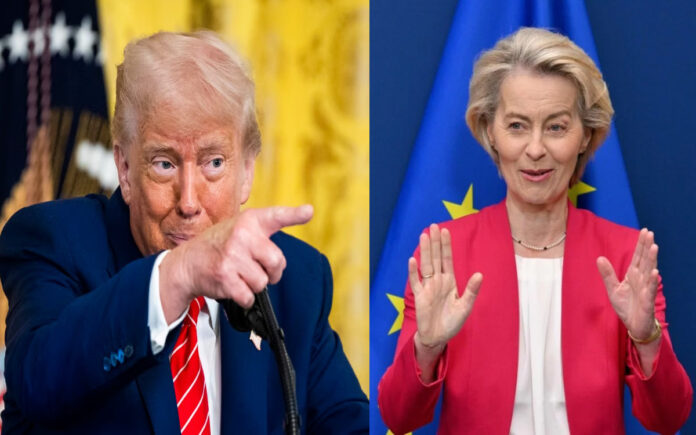Morristown, New Jersey: President Donald Trump announced on Sunday that he would delay the imposition of 50% tariffs on European Union imports, pushing the deadline to July 9 in a bid to give trade negotiations with the 27-nation bloc more time to produce a workable deal.
The decision marks a shift from Friday, when Trump expressed deep frustration over what he described as slow-moving talks with the EU and recommended that the steep tariffs be enforced starting June 1. The threat rattled global financial markets and raised concerns of a further escalation in the ongoing trade standoff.
Trump, who has consistently criticized the EU’s trade practices, agreed to the delay after a phone call with European Commission President Ursula von der Leyen, who requested an extension to the original 90-day negotiation period established in April.
“We had a very nice call, and I agreed to move it,” Trump told reporters before departing New Jersey for Washington. “She said we will rapidly get together and see if we can work something out.”
Von der Leyen echoed the sentiment in a post on X, writing that she had a “good call” with Trump and that the EU was prepared to engage swiftly. “Europe is ready to advance talks swiftly and decisively,” she said. “To reach a good deal, we would need the time until July 9.”
Following the announcement, both the euro and the U.S. dollar strengthened against traditional safe-haven currencies like the yen and the Swiss franc, reflecting market optimism about the de-escalation.
Also Read | Trump: US Trade Policy Focused on Building Tanks, Not T-Shirts
In early April, Trump had set a 90-day window for reaching a trade agreement with the EU, ending July 9. However, on Friday, he abruptly dismissed the prospect of a deal, stating, “I’m not looking for a deal. We’ve set the deal – it’s at 50%.” That declaration sent major U.S. and European stock markets tumbling, while the dollar also weakened.
Also Read | Trump Hints at Progress in US-Iran Nuclear Talks After ‘Very Good’ Weekend Discussions
Although the Trump administration has recently reached trade arrangements with the United Kingdom and resumed dialogue with China, progress with the EU has been slower. The delay in talks has contributed to growing tensions between Washington and Brussels, as Trump’s “America First” trade agenda continues to clash with Europe’s strategic and economic interests.



